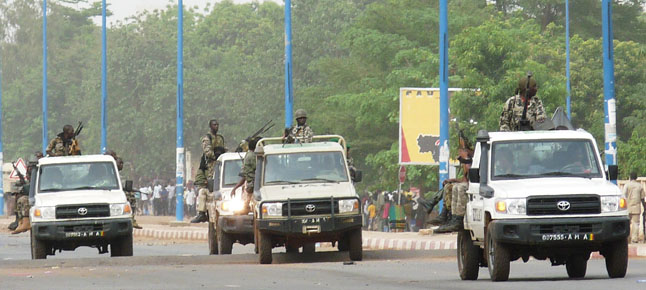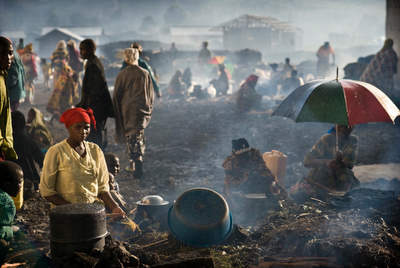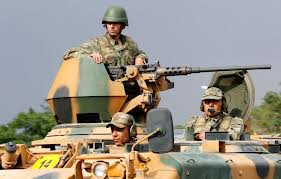
When Regional Solutions Fail: The French see good reasons for intervening in Mali, but their decision is a risky one
The announcement by French President Francois Hollande that his country is engaged in a military intervention in Mali represents a significant shift in strategy for the former colonial power in Africa. Up until a couple days ago, France was very much the reluctant intervener, investing all of its energy in coordinating a multilateral intervention (led by the Economic Community of West African States, ECOWAS) to forestall the further advance of Islamist forces in the Sahel region, and in reassuring worried African states, such as Algeria, that France’s days as an ‘African policeman’ were long gone.

Humanitarian Ethics: Balancing theory and practice
On December 7th the Saïd Business School’s Centre for Entrepreneurship and Innovation hosted a seminar entitled “Protecting Civilians: Oxford and Oxfam working together on the ethics of war, weapons and humanitarian aid.” The seminar showcased two projects led by the Oxford Institute of Ethics, Law and Armed Conflict (ELAC) that engage with outside actors to leverage humanitarian ethics in humanitarian crises and armed conflicts.

IR Analysis: The Arab awakening has sparked a foreign policy shift in Turkey and Qatar
The Arab awakening arguably represents the most important transformation of Middle Eastern politics since the end of colonialism. How will the regional powers adjust their foreign policies to the new regional environment is however still extremely uncertain. This uncertainty is partially due to the well-known inability of international relations scholars to make assured predictions, but also to the fact that the dynamics of foreign policy shifts are still widely overlooked and generally misunderstood in the scientific literature. Is ‘foreign policy change’ a mere adaptation to changes taking place in the domestic arena, as argued by most IR liberals? Or is foreign policy behaviour wholly dependent on the international distribution of power, as argued by realists? Or is there room for autonomous decisions that are not only reactions to exogenous sources of change, but are purposive and proactive actions in their own right?
The Arab awakening will most likely be a crucial case study to test each of these hypotheses.

Geopolitics Inside the Tunnels: Israel and the Iran-Hamas duo are benefiting from the tragedy in Gaza
Hamas has been in power in Gaza – and democratically elected – since 2006. Hamas controls what comes in and out of Gaza through tunnels – more than 700 were reported in 2011. Hamas is not only the government, it is the organisation on which Gazans rely for schooling, health, housing and protection. Of course international organisations in Gaza play a large role in providing those services too, but Hamas is the overarching authority. Now that Hamas and other para-military organisations such as the Palestinian Islamic Jihad and Popular Resistance Committees, along with Salafi groups and even the al-Aqsa Martyrs Brigade are firing rockets at Israel intensely again, why are Gazans supporting them?

The story of how a little girl from Swat became a rallying point against the Taliban
In January 2009, Pakistan’s Swat valley was fully under the control of a Taliban affiliate, Tehrik-e-Nifaz-e-Shariat-e-Muhammadi(TNSM), and its leader Sufi Muhammad had issued a decree banning female education in the area. Only a handful of schools there had escaped the Taliban’s destructive wrath. While fear gripped the entire valley, Malala Yousafzai, an eleven years old girl from Swat’s Mingora town, began telling the world her innocent tales of surviving the Taliban’s ban on education.

The Best Defence is Dialogue
The recent visit to Beijing by the U.S. secretary of defense, Leon Panetta — which coincided with State Department statements that the U.S.-Japan security treaty would apply to the disputed Senkaku Islands — highlights the growing tension with China over America’s military presence in Asia, Chinese efforts to counteract it, and the dangerous misperceptions that can arise if defense strategy gets in the way of diplomacy.

International Conflicts: What is the difference between risk and uncertainty?
To answer this question, I’ll begin with a few basic statements. Risk is tangible; uncertainty is not. One can define risk, but one can barely delineate the outer layers of uncertainty. Risk can be rendered concrete; uncertainty cannot.

Mass Demonstrations – a new challenge for humanitarian action?
If humanitarian agencies have been preoccupied with intra-state wars in the last twenty-five years, might they now have to refocus and respond to humanitarian needs around mass demonstrations? The rise in mass protests against dictators, mining companies and western media suggests they might. Mass demonstrations have been a significant part of political life for centuries. In France, eyewitness accounts of the protests supporting the Paris Commune in 1871 describe “waves of people” overpowering military positions. In Britain, some years later, the suffragettes brought 500,000 people to a mass protest in Hyde Park in 1908. Mass demonstrations were an essential part of the Indian independence movement against British imperialism in the first half of the twentieth century. In the second half …









